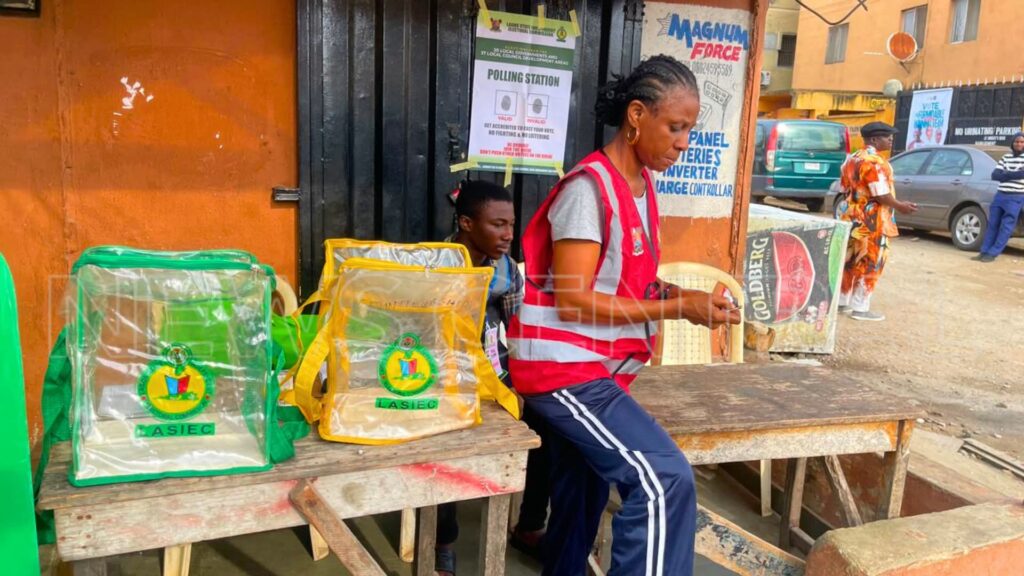By Abdul Lauya
The All Progressives Congress (APC) has swept the just-concluded local government elections in Lagos State, securing all 20 constitutionally recognized Local Government Areas (LGAs), all 37 Local Council Development Areas (LCDAs), and 375 out of 376 councillorship seats.
The Lagos State Independent Electoral Commission (LASIEC), which conducted the elections, declared the results over the weekend amid growing criticism from opposition parties and civil society actors.
The APC’s dominance was total, reaffirming its stronghold over Lagos’s grassroots political architecture. Notable among the victorious candidates are Hon. Olamilekan Olu Akindipe of Ajeromi-Ifelodun LGA, Barr. Moyosore Ogunlewe of Kosofe LGA, Princess Surah Olayemi Animashaun of Epe LGA, Otunba Kehinde Almaroof-Oloyede of Oshodi-Isolo LGA, and Prince Adedayo Abdullateef Ladega of Ikorodu LGA.
In the LCDAs, winners included Hon. Rasaki Bamidele Kasali of Lekki, Hon. Rauf Kayode Yemaren of Eti-Osa East, and Hon. Kareem Azeez Abiodun of Oto-Awori.
However, in a result that stood out from the near-total APC sweep, the Peoples Democratic Party (PDP) was declared winner of just one councillorship seat. Yet, LASIEC did not disclose the name, ward, or vote count of the lone PDP winner, raising questions about transparency and the credibility of the results. Despite the silence on the specifics, the symbolic significance of that sole win has triggered fresh conversations on the state of grassroots democracy in Lagos.
The PDP and other opposition parties swiftly rejected the outcomes, describing the polls as a sham. PDP’s Deputy Chairman in Lagos, Tai Benedict, condemned the process as heavily manipulated, alleging ballot stuffing, voter suppression, and deliberate exclusion of opposition candidates.
Labour Party’s Sam Okpala was more scathing, insisting there was “no election,” and accused APC loyalists of hijacking the entire process through vote-buying and intimidation.
Former Deputy Governor of Lagos, Kofoworola Bucknor-Akerele, added her voice, demanding a cancellation of the results and the conduct of a new, credible election.
While LASIEC and state officials hailed the polls as peaceful and orderly, the prevailing atmosphere tells a more complicated story. Voter turnout was visibly low in several areas, a trend that observers say reflects rising voter apathy and disillusionment with the electoral process.
The near-total victory by the ruling party only reinforced perceptions that local government elections, often managed by State Independent Electoral Commissions, are fundamentally skewed in favor of incumbent administrations.
Still, the APC’s political machine appears unshaken. Its clean sweep of all chairmanship positions and almost every councillorship seat strengthens its grip on local structures ahead of the 2027 general elections.
The party now controls not only the levers of local administration but also the crucial networks of influence at the ward level.
However, while APC loyalists celebrate, the democratic value of such one-party dominance remains in question. A 99.7% victory margin in a multi-party context, coupled with widespread opposition rejection, risks undermining public faith in electoral integrity.
Though technically an election was held, critics argue that the process fell far short of what democratic competition demands.
With the results now sealed, attention shifts to whether the elected officials can deliver tangible governance outcomes that justify their mandate.
For the opposition, the work of rebuilding, organizing, and holding power to account will be uphill, but necessary if Lagosians are ever to experience competitive, participatory democracy at the grassroots.
For now, the APC stands as the unrivaled political force in Lagos. But beneath the surface of this sweeping victory lie deeper questions about fairness, transparency, and the long-term health of local democracy in Nigeria’s most populous state.
For advert placement and inquiries, publication of press releases, and news coverages, please call: Phone: 08052898434 Email: editor@eyereporters.com, click here to view the advert rates.



